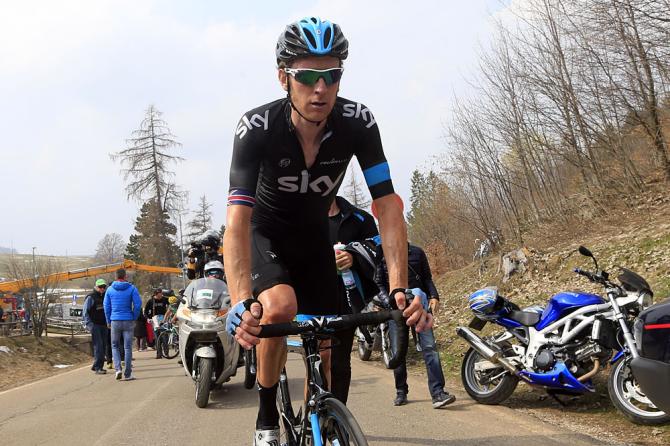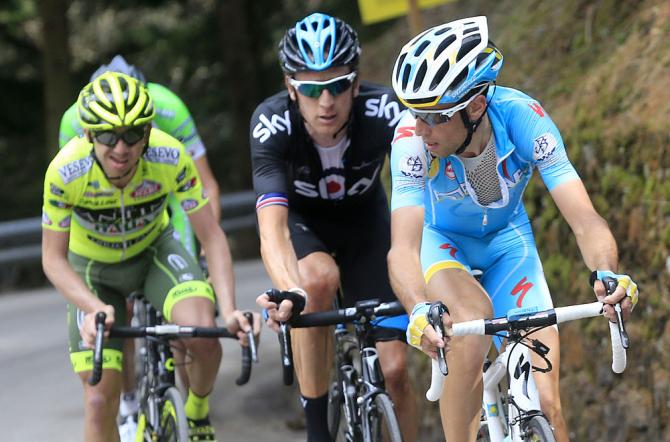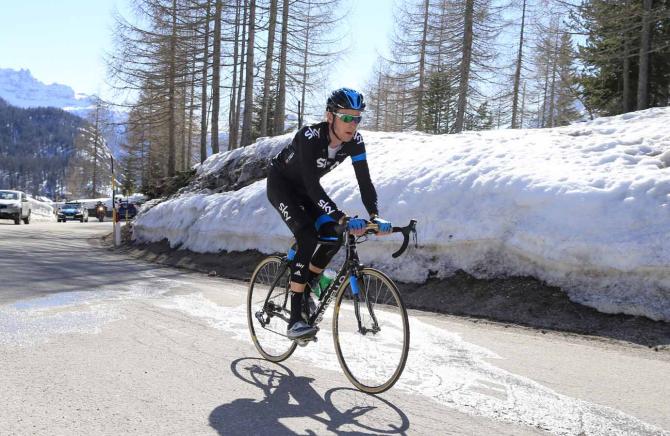Giro d'Italia 2013: Can Sir Wiggins arise to the challenge?
Giro Countdown: 8 days till Naples




When Bradley Wiggins lines up at the start of the Giro d'Italia in Naples on May 4 he will unequivocally be a different athlete a different athlete to the one that made his Grand Tour debut in Italy in 2003. This time he will be riding to win.
Ten years ago survival was the order of the day. A debut Grand Tour is typically the case: pick your way through each day, drag yourself over the mountains and if you are lucky and brave enough, show your sponsor’s jersey with an attack or two.
Ten years is a long time, especially in cycling. Wiggins did not finish the 2003 Giro d'Italia, missing the time cut on stage 18 along with 35 other riders. Since then Lance Armstrong has soared to his greatest height before falling to earth in shame, peloton speeds have slowed and Wiggins became a Grand Tour leader, Tour de France winner and collected a knighthood.
Leaving the rhetoric of flag waving home press of ‘boy from Kilburn done good’ aside, it’s been an astronomical rise. Before taking Grand Tours seriously in 2009, Wiggins’ focused on time trials and breakaways, never believing he could become an overall contender. Three years later he’d bludgeoned his way to fourth [later third] and picked up an eye-watering contract to boot, moving up from the gruppetto to battling shoulder to shoulder with the Schlecks, Armstrong and Contador.
Fast forward to the present day and Wiggins will start this year's Giro d'Italia as the favourite to win the maglia rosa. Vincenzo Nibali (Astana) and Ryder Hesjedal (Garmin-Sharp) might dispute that claim but this year's race is Wiggins to win, if he can repeat the form he displayed in last year’s Tour de France.
A different Grand Tour objective, without doping questions
It’s of interest that Wiggins has chosen to target the Giro over the Tour. Most defending champions automatically prefer the glory of a title defence. In Wiggins' case, it’s about completion – winning an array of major races - and ticking off a box. First it was the track and Olympic success, and the Tour dream soon followed. Missions accomplished with aplomb and now the emphasis has shifted to the more romantic Grand Tour. ‘Achieving greatness’ was the term bounded around when Team Sky first teased the media with Wiggins' next target, although making history and enjoying the dolce vita of Italy, coincidently blends with Team Sky’s Italian economic interests and Michele Acquarone’s persuasions certainly helped too.
Get The Leadout Newsletter
The latest race content, interviews, features, reviews and expert buying guides, direct to your inbox!
"My first Grand Tour was the Giro,” Wiggins tells Cyclingnews.
“Cycling has changed a hell of a lot since then. At the time I remember it being the worst thing I'd ever done. Things have changed a lot and now I'm in a position to be able to compete for the Giro. At the time I was a case of staying the gruppetto. Unfortunately those days have gone for me.”
Wiggins is quick to point out that the Giro d'Italia offers a more relaxed environment, something Acquarone has been careful to cultivate since taking over the reins in 2011.
"I like that all the pre-race talk has been about the racing. There hasn't been one question about doping yet. At the Tour de France you have this continual questioning about doping. When you race in Italy it's about the love of the racing and the sport. You don't seem to have that element of the media that is just there for negative stories," he said.
That negatively boiled over at last year’s Tour when Wiggins showed his sensitivity and frustration, calling sections of the Twittersphere all the names under the sun after the team were questioned over their dominance and working relationship with Dr Leinders. The Tour de France microscope creates an intense burn and Wiggins certainly wasn’t the first rider to briefly wilt. The Giro d'Italia, may well better suit Wiggins’ demeanour and laidback attitude.
“As a rider you want to concentrate on the race. At the Tour you feel you're having to constantly justify yourself. It makes you wonder why you're doing it. You ask 'What's the point in getting up in the morning?' That's quite hard to do in front of the eyes of the whole world when you're wearing the yellow jersey.”
“I said a few times that I didn’t enjoy the Tour de France last year, for that reason alone. I enjoyed the last weekend but I didn’t enjoy that constant day in day out stuff. Hopefully the Giro will be a lot different. No matter all the controversies outside of the Giro and cycling, it never seems to creep into the Giro. As a rider, when you're competing, it's helpful.”
You can't win the Giro with just the time trials
All around the world, cycling fans and the media will be watching Wiggins at the Giro d'Italia. The 96th edition of the race promises to be one of the most enthralling yet. RCS have captured a stellar cast – barring Contador almost all the top GC riders have been assembled – and a balanced route should build to a breathless crescendo over the final five blockbuster stages.
Wiggins and Vincenzo Nibali have been billed as the star crossed superstars set to go head to head, with defending champion Ryder Hesjedal given a polite nomination too. Wiggins’ preparation has understandably been different from last year’s Tour, when he steamrollered through a series of stage races before sealing his Tour title.
This year Team Sky’s and Wiggins’ juggernaut tactics has been kept in check and exchanged for more training at altitude and in Mallorca. Indeed the British rider is still without an individual win since last year’s Olympic time trial.
“The races I’ve done this year have all been about not relying on the time trials so it’s been about getting into that frame of mind and it’s been good,” he explained.
That may turn into an advantage for the British rider. The expectancy is for Wiggins to ride conservatively in the mountains under the guidance of the metronomic cadence support from his team and then stamp his authority and gain time on his rivals in the time trials. But even his hero Miguel Indurain occasionally tore up the script and attacked – Hautacam 1994, Liege 1995 – to surprise his rivals.
“The time trials are a bonus in many ways but they’re not the sole thing to rely on because I don’t think you’re going to win the Giro on just the time trials. It’s much more about the climbs at the Giro," Wiggins said.
"It might be beyond us to think that we can control the race for two weeks like we did at the Tour because it’s a completely different race.”
As a result Team Sky has selected a number of climbers to assist in Wiggins’ challenge. Rigoberto Uran and Sergio Henao both made the top ten in last year’s race and could both conceivably lead teams in their own rights. It’s often overlooked that Team Sky has recruited and honed riders that are far more capable than the support role they often fill.
They’ll need them at the Giro d'Italia. Astana will be throwing their entire weight behind Nibali in a rematch from last year’s Tour de France.
“I guess Nibali and I are both tried and tested. We both raced the Vuelta a few years ago and the Tour last year. There’s not many current riders in the peloton that have won a Grand Tour and we’re both one of them, so I guess that’s how it’s going to pan out,” Wiggins pointed out.
“He’s a better climber than me so I have to ride to my strengths. Nibali is much more of a classic rider in that sense of an attacking aggressive style. It’s not all about the uphills, as Tirreno proved and I think that a bigger part of the Giro as well.”
A long spell in the maglia rosa?
Wiggins could find himself in the maglia rosa on just the second day with the team time trial coming just before a set of two medium mountain stages, while the ling time trial comes on stage eight. It begs the question as to whether Team Sky will try and control the race in the manner they did in last year’s Tour.
“It might be beyond us to think that we can control the race for two weeks like we did at the Tour because it’s a completely different race,” he admitted.
“We had to defend at the Tour for two weeks. In an ideal scenario, you take the jersey on the last day. But you do what you can when it's thrust upon you.”
“It would be an almighty, God forgiven challenge to control the Giro for two weeks if you take the jersey. But you do what you do at the time. The Giro is a different race, with bigger challenges early in the race and then are more consistent during the race. It's less predictable than the Tour de France.”
Daniel Benson was the Editor in Chief at Cyclingnews.com between 2008 and 2022. Based in the UK, he joined the Cyclingnews team in 2008 as the site's first UK-based Managing Editor. In that time, he reported on over a dozen editions of the Tour de France, several World Championships, the Tour Down Under, Spring Classics, and the London 2012 Olympic Games. With the help of the excellent editorial team, he ran the coverage on Cyclingnews and has interviewed leading figures in the sport including UCI Presidents and Tour de France winners.
